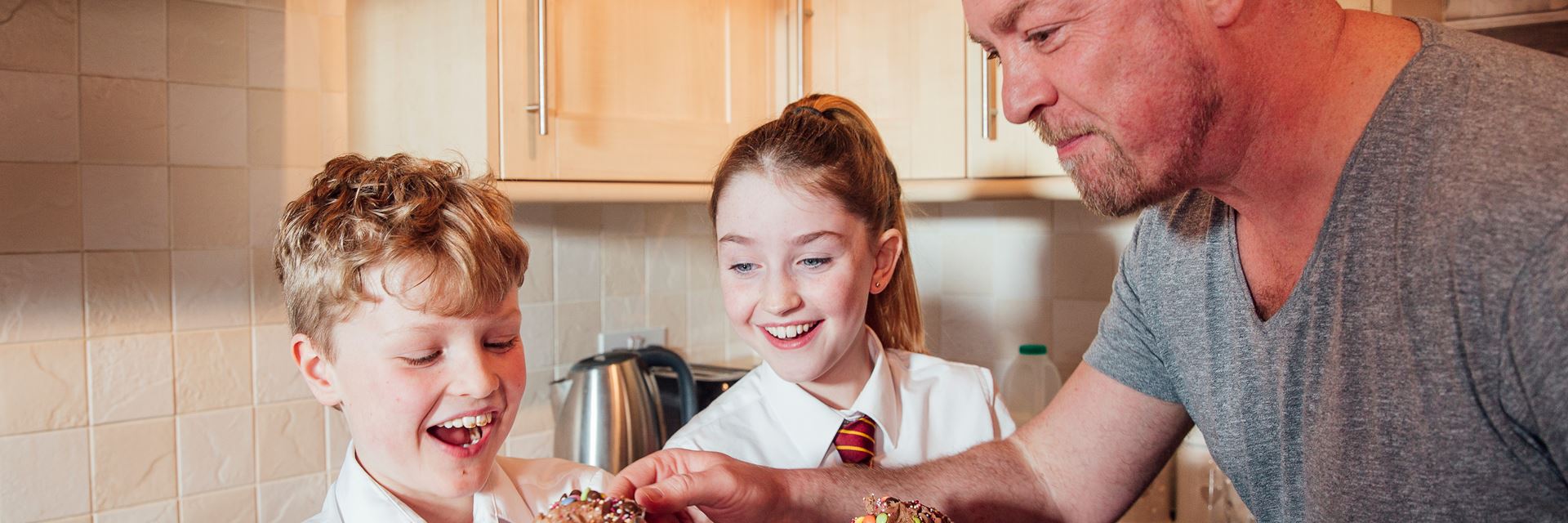What is short-term fostering?
Short-term fostering (or interim fostering in Scotland) means you're caring for a child for any time between 1 day and 2 years, and it's the most common way to foster a child.
Short-term fostering provides a safe and stable home environment to children at a difficult time and helps them to maintain a normal life – including going to school and having fun, as well as keeping in touch with their birth parents (or their new family if they’re being adopted).
Why do children need short-term foster care?
The reasons children need short-term foster care are as varied as the children themselves but they’ll all have been identified as safer in the care of a foster family. Some of the reasons include, but are not limited to:
- They’re identified as being at risk from abuse or neglect
- They’re awaiting court proceedings
- They’re nearing the age of 18 and independence
- They’re waiting for adoption papers to come through
- Their parent or parents can’t cope or have been taken ill suddenly
- There’s been a family crisis or breakdown, such as financial problems
In pretty much all cases, everyone’s working hard behind the scenes to put longer-term plans in place and, best of all, to get the child back to their birth family. It’s not possible to know how long this will take, and sometimes it’s not possible at all.
On the occasions where it's not possible for a child to return home, the longer-term plan may be for them to remain in foster care until they reach adulthood.
This may be something that's discussed with you as the short-term foster parent if it's in the child's best interests to stay with you, and of course, if you, the local authority and the child agree. Otherwise, you'll play an important role in supporting the child transition into long-term fostering placements.

5 benefits of short-term fostering
Whether it’s a couple of nights or a couple of years, you can always make a huge positive impact on children’s lives through short-term fostering. It’s the type of care the majority of young people need, and it’s highly rewarding too.
- You’re providing vulnerable children with safety and comfort during what is often a very stressful time in their life.
- Short-term fostering means you’re able to help as many children as you can who desperately need the stability of a family home.
- Fostering a number of children on a short-term basis allows you to keep learning new skills and develop your professional career, as you’ll experience looking after different children with a range of needs.
- You’ll play a role in helping children either get back with their birth parents or into a long-term placement, which is an important and noble job to do.
- If you’ve got a lot of love to give, short-term fostering is the perfect way to give back to the community and help create brighter, prospective futures for young people.
The role of a short-term foster carer
Your main job is to provide security and stability for children going through a difficult time, but being a short-term foster parent is much more than that.
It’s also about being there when they need an ear to listen, working with them to deal with their emotions and helping them overcome their past one small step at a time. There are also practical things you’ll need to do to ensure they maintain a regular childhood life.
- Take them to and from school and encourage their education.
- Ensure they attend any medical or therapy appointments.
- Facilitate visits with the birth family, known as ‘contact’. This can be an emotional time for a foster child so your support will be much needed.
- Give them plenty of opportunities to play, have fun and experience new things.
- For short-term mother and baby fostering, where a parent and baby are placed in your care usually for around 12 weeks, you’ll guide them in how to provide the best care for their child.
How do local authorities place children with families?
When a child comes into foster care, the local authority becomes responsible for their health, safety and wellbeing, and while local authorities have their own 'pool' of foster parents, sadly they generally don't have enough to cope with the rising number of children needing a foster home. That's where specialist independent fostering agencies, like Fosterplus, come in.
We work with local authorities across England and Scotland, and receive hundreds of referrals every day. Our dedicated referrals team review each referral and identify any foster families who could meet the child's needs. If all parties agree - the foster parents, their Fosterplus social worker and regional manager, and the local authority - then we'll work closely with the local authority to make arrangements. Wherever possible, this will also include initial introductions between the child and family.
What are the different types of fostering?
We offer many different types of fostering so we can continue to meet the ever-changing needs of children and young people in foster care. These include short-term or interim care (up to 2 years), long-term or permanent care (more than 2 years and until the child turns eighteen), emergency, respite and more.
We also provide foster care placements that are considered specialist, including parent and child fostering and caring for children with disabilities or those seeking asylum. Learn about the different types of fostering below.
Who can become a foster parent?
Almost anybody can apply to become a foster parent - the only initial requirements are that you're over 21 years old, you have the legal right to work in the UK and that you have a spare bedroom that's always available to a child in your care. Of course, you'll also need to be kind, caring and dedicated to making a difference to a child.
Other than that, we welcome applications from people from all backgrounds, religions and ethnic groups. You can be gay, straight, bisexual or transgender, single, married or cohabiting. We also support foster parents with disabilities and health conditions, who are able to meet the needs of children in care.
So if you've ever wondered whether you could foster - we can't encourage you enough to take the first step and speak to our friendly team.
How do you become a foster parent?
The first step is to have a chat with one of our friendly advisors - either complete our online form or give us a call on 0800 369 8512. We'll speak to you about the role, take a few details and answer any of your questions.
When you're ready to progress, there's a standard application and assessment process that you'll need to go through to become an approved foster parent, including home visits, background checks and references, training and attending a fostering panel. You can find out more about each step below.
Other types of fostering
Please make sure you read our terms and conditions because you're agreeing to them by submitting an enquiry. It's also worth reading our privacy policy and cookies policy so you understand how we collect and use your personal data. This site is protected by reCAPTCHA and the Google Privacy Policy and Terms of Service apply.
Please make sure you read our terms and conditions because you're agreeing to them by submitting an enquiry. It's also worth reading our privacy policy and cookies policy so you understand how we collect and use your personal data. This site is protected by reCAPTCHA and the Google Privacy Policy and Terms of Service apply.
Discover everything you need to know about fostering by downloading our brochure, including;
- Types of fostering
- Requirements to foster
- Application process
- Training and support
- Allowances and benefits
Fill out your details on the following form and you'll receive our Guide to Fostering.
Can't find what you're looking for?
By phone
One of our team is available to talk to you over the phone to answer any of your fostering queries.
Enquire online
You can get in touch by filling out our online enquiry form with any queries that you may have.
Your local team
Find contact details for your local office team. We’re always happy for you to pop-in and chat.









